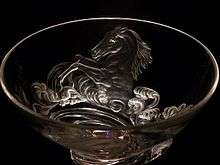Glass engraving

Glass engraving is a form of decorative glasswork that involves engraving a glass surface or object. It is distinct from glass art in the narrow sense, which refers to moulding and blowing glass, and from glass etching which uses acidic, caustic, or abrasive substances to achieve artistic effects. Some artists may combine two or more techniques.
Glass engraving encompasses a variety of techniques. One notable form is intaglio work, with images and inscriptions cut into the surface of the glass through abrasion. Glass engraving tools are therefore small abrasive wheels and drills, with small lathes often used. Engraving wheels are traditionally made of copper, with a linseed oil and fine emery powder mixture used as an abrasive.
.jpg)
Other forms of engraving are "stipple" and "drypoint" in which the surface of the glass is abraded with the use of small diamond tipped burrs. The scratches and small dots made in this method can, in the hands of a skilled artist, be used to produce images of astonishing clarity and detail. Notable practitioners of this form are James Dennison Pender and the late Lawrence Whistler who began a revival in England.
Sandblasting is yet another technique used in glass engraving. Abrasive is sprayed through a sandblasting gun on to glass which is masked up by a piece of stencil in order to produce inscriptions. This is more of a commercial glass engraving technique employed by companies like Crystal Galleries Ltd in order to engrave on crystal awards and glass awards.
Glass engraving is considered by many to be a dying art form. While this is far from accurate it is certainly a form that has seen its heyday come and go. Despite this there are still many glass engravers who are producing bold dynamic and aesthetically challenging artworks. In the UK one of the most notable artists is Alison Kinnaird MBE. Based in Scotland she splits her time between glass engraving and playing the traditional Scottish harp. In recent years these two apparently disparate mediums have been combined when she composed music to accompany her piece "Psalmsong" which is now installed in the Scottish Parliament building.
The UK currently has a Guild of Glass engravers based in London and lists a number of well respected glass artists as members, including some overseas. These include Katherine Coleman MBE, Sally Scott, Tracey Sheppard, Dominic Fonde and Ronald Pennell. It has an online gallery of members works with contact details for commissions and classes for people who want to learn about this art. A general exhibition is held every two years. The most resent ones at the FitzWilliam museum in Cambridge 2010 and Stourbridge Red Cone galleries in 2012. Local branches in the UK meet for joint practical work, tutorials, and hold regional exhibitions.
Meanwhile, the Czech republic having produced many world class glass artists can lay claim to one of the very best, Jiri Harcuba. Every two years the Czech Republic hosts a conference aimed specifically at glass engravers. Other prolific notables around the world are Kevin Gordon in Australia and Lisabeth Sterling in the United States.
Some artists, such as Lesley Pyke, combine the art of drill engraving with sandblasting and sometimes acid etching as well. All three techniques create completely different effects.
An example of a relief illusion created from an intaglio cut form can be observed on this bowl engraved by Edmond Suciu, using the techniques of diamond and copper wheel engraving.
References
| Wikimedia Commons has media related to Glass engraving. |
| ||||||||||||||||||